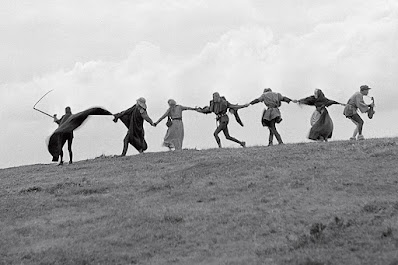This morning saw the 1,000th edition of what’s become my favourite radio programme, In Our Time. The format is simple; a single subject (usually from the arts, science or history) is chosen for each show, and Melvyn discusses it with three experts. Today it was Bergman’s The Seventh Seal.
But Bragg does something that few other presenters these days bother with. He researches. He bones up on the topic, so his questions are rooted in informed curiosity rather than bafflement. He never pretends to know more than the invited boffins, but he can hold his own. (For a more representative example of modern factual broadcasting, see Channel 5’s Lost in Japan, in which Jane McDonald stumbles around with the glazed expression of someone never even heard of Japan, let alone Googled the place. It‘s as if the producers are so terrified of going over the heads of the audience that they imagine the least-informed potential viewer, then pick a presenter who knows even less, or is prepared to feign that ignorance.)
Two things from an interview with Bragg broadcast shortly before the show. One is that when choosing his guests, he tries to get teaching academics, who have real, recent experience of communicating their insights to 18-year-olds, rather than just talking to other professionals. The feel should be that of an undergraduate tutorial, which may sound exclusive but since well over 30% of teenagers now go into higher education, really isn’t. And then, asked to sum up the show, he used the delicious phrase “never knowingly relevant”, an implicit up-yours to the Gradgrindian tendency infesting education and politics. No, it’s not to any practical purpose, it’s not going to get you up another rung of any professional ladder. It’s just about Bergman (or chromosomes, or the Thirty Years War, or Hildegard von Bingen, or...)
Here’s to another 1,000 episodes of irrelevance.

2 comments:
Interesting point -- I feel similarly about podcasts. The ones where the presenters prepare, ask questions no one else would ask, are prepared for real dialogue are much more interesting than just chit-chat or getting their guests to regurgitate the same memorized elevator pitch they gave everyone else are the ones I want to bother listening to.
Yes, and the same thing applies to TV talk shows. Looking at the old Dick Cavett shows from the late 60s/early 70s (or, from a UK perspective, Parkinson from the same era), there's a level of articulacy and erudition that would leave most modern hosts (and viewers?) gasping, yet the vibe is entirely relaxed, unforced. Inevitably there are stories that have been told before, and if someone has a book/movie/album out it might get mention but it just seems to arise.
Post a Comment